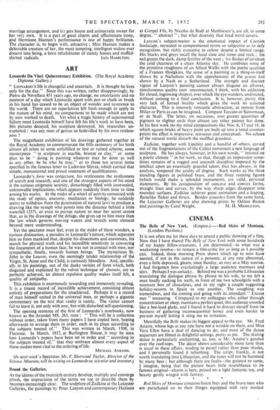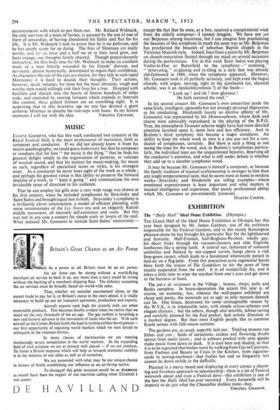CINEMA
The Belle of New York. (Empire.)—Red Skies of Montana. (London Pavilion.)
IT is not often my lot these days to attend a public showing of a film. Now that I have shared The Belle of New York with some hundreds of my happy fellow-creatures, I am determined—in what was a weakening resolve—to remain a film-critic for as long as I possibly can. Indeed, those morning Press shows which up to now have seemed, if not in the nature of a penance, at any rate abnormal, even a little depraved, gleam, since Sunday, as rosy as a May sunrise. I had forgotten how everlastingly a large audience murmurs and stirs. Perhaps I was unlucky. Behind me was a probable Lithuanian translating the dialogue phrase by phrase to his wife, to my left a man loudly sucking his teeth, in front of me two schoolgirls with a resonant box of chocolates, and to my right a couple suggesting holiday-resorts in Spain to one another. The coughing was tremendous, and the coming and going with its attendant " Excuse mes " unceasing. Compared to my colleagues who, either through concentration or sleep, maintain a perfect quiet, this audience sounded like a bee-loud glade, and I found it hard to distract myself from its business of gathering inconsequential honey and even harder to prevent myself letting it sting me to irritation.
Mercifully the Belle makes its biggest appeal to the eye. Mr. Fred Astaire, whose legs at any rate have not a wrinkle on them, and Miss Vera Ellen have a deal of dancing to do, and most of the dance sequences are filmed in delightful settings, pretty as pie. The skating dance is particularly enchanting, as, too, is Mr. Astaire's gambol over the roof-tops. The decor shows considerably more taste than is usual in these affairs, tending to pastel rather than puce shades, and I personally found it refreshing. The script, frankly, is not worth translating into Lithuanian, and the tunes will not be hummed by many bees ; but although there are faults—the greatest to some, I intagine, being that the picture bears little resemblance to its famous original—charm is here, poised on a light fantastic toe, and beauty gently winged with fantasy.
Red Skies of Montana concerns forest fires and the brave men who are parachuted on to their fringes equipped with very modest
accoutrements with which to put them out. Mr. Richard Widmark, the only survivor of a team of heroes, is accused by the soft of one of them of cowardice, of having abandoned his father and fled for his life. It is Mr. Widmark's task to prove that he is no poltroon, and he has ample scope for so doing. The fires of Montana are really terrific, and for an hour and a half we sit in their lurid glow, our faces orange, our thoughts faintly charred. Though preponderantly instructive, the film finds time for Mr. Widmark to make an excellent study of a man bitterly wounded by his friends' distrust, and nervously, almost hysterically, determined to regain their confidence. As characters the rest of the cast are elusive, for they talk in such rapid Montanese it is hard to decode their thoughts. Their actions, however, speak volumes, for none but the most altruistic, tough and worthy men would willingly risk their lives for a tree. Dropped with hatchets and shovels into the hearts of forests hundreds of miles wide, and encircled by roaring furnaces which explode at intervals like cannon, these gallant firemen are an ennobling sight. It is surprising that in this inventive age no one has devised a giant airborne Minimax to douche the tree-tops with foam. In my leisure



































 Previous page
Previous page